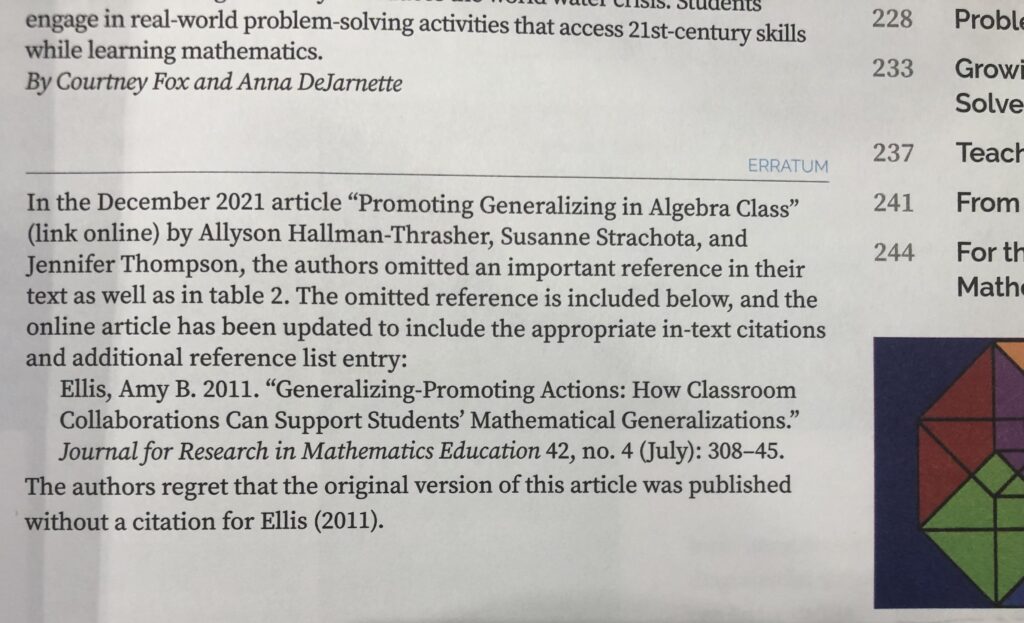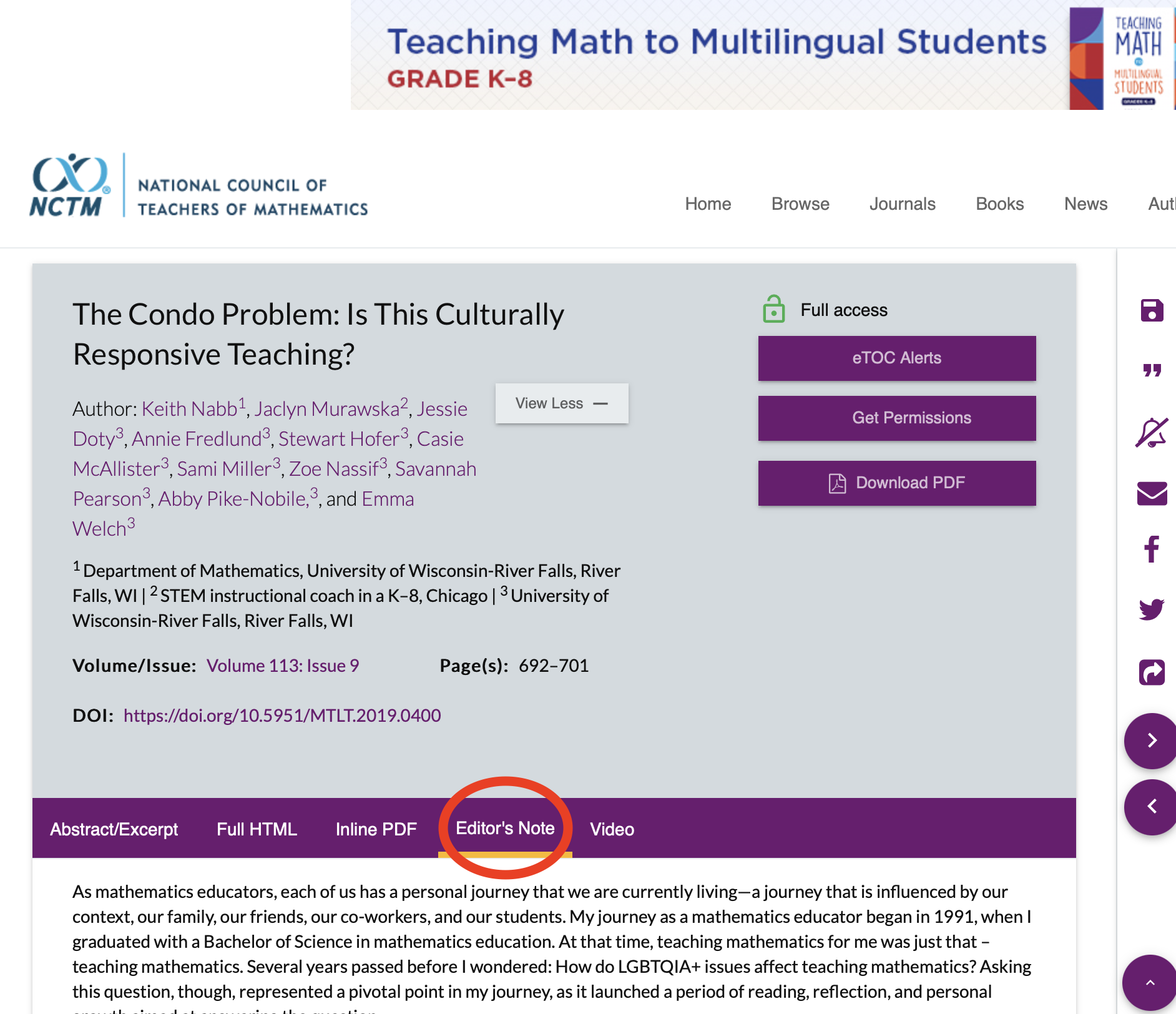Our Institutions Are Failing Us:
Why I Resigned
This week I finally got my March copy of MTLT. The Table of Contents of this month’s issue contains an erratum (see below photo) that points out an instance of (unintentional) plagiarism from the December issue. I knew this erratum was coming, and it was the deciding factor for my resignation as Associate Editor. The erratum itself was not the problem. Of course we should issue a correction in instances of plagiarism! It is the inclusion of the erratum in this issue, while simultaneously ignoring other instances of systemic oppression that took place in previous issues (with no real acknowledgement of “oops, our bad!”) that is the problem. The goal of this post is to provide the sequence of events that led to my resignation and how this erratum contributed to my larger understanding of who and what the “powers that be” care about in the math education community.

To lighten what would otherwise be a traumatic retelling of events, I’ve included gifs from my favorite show throughout. Mostly for me, but maybe also for you.

In September of 2020, MTLT published a front and center piece titled, “The Condo Problem: Is This Culturally Responsive Teaching?.” Taken at face value, the article was written to discuss how the popular “condo problem” served to further marginalize LGBTQ+ folx. Sounds good, right? Well, not exactly. You see, this article was riddled with micro-aggressions – from the constant centering of the dis/comfort of the authors and the mathematics (but the math of the problem is too good to get rid of it!), to a closing statement that recognized that not all folx would find LGBTQ+ inclusive education as morally correct.
This article deeply offended me and many other LGBTQ+ identified educators. So, I called it out. I wrote an email to the editor that outlined exactly why the article was harmful and was encouraged to rework it as a letter to the editor, to be included in a future issue. Encouraging right? Again, not exactly. You see, when the letter to the editor was published in May 2021 (you may view my letter to the editor here), it appeared only in the online version of the journal. This may be procedure for letters to the editor, but NCTM had advertised the original condo problem article across their social media platforms when that issue was published, and the official accounts made no effort to draw their followers’ and members’ attention to the harm that article caused. Many were left to believe the authors’ framing was perfectly fine, admirable even. I mean, they tried to include LGBTQ+ identity in their teaching, don’t they deserve a pat on the back?

To add insult to injury, the authors were given the opportunity to respond to my letter (you may view the response from one of the authors here). I did not object to them having this opportunity, but the fact that they knew about my letter before publication and I did not know about theirs was another example of putting the comfort of those who have caused harm over those who have been harmed. Again, I called this out. I reached out to multiple folx in leadership to draw attention to the problem, especially the lack of public acknowledgment from NCTM that the original article caused harm. I was told that folx were “on it.” After multiple inquiries about what being “on it” meant, I finally received an answer. The Editor in Chief had drafted a note that would be appended to the original article. This note read:
As mathematics educators, each of us has a personal journey that we are currently living—a journey that is influenced by our context, our family, our friends, our co-workers, and our students. My journey as a mathematics educator began in 1991, when I graduated with a Bachelor of Science in mathematics education. At that time, teaching mathematics for me was just that – teaching mathematics. Several years passed before I wondered: How do LGBTQIA+ issues affect teaching mathematics? Asking this question, though, represented a pivotal point in my journey, as it launched a period of reading, reflection, and personal growth aimed at answering the question.
For most of us, our personal journey involves a desire to support all students in learning mathematics. In the article “The Condo Problem: Is This Culturally Responsive Teaching?” (Nabb et al. 2020), the authors share their personal experiences, providing a narrative that communicates the importance of embracing culturally responsive teaching and inclusive pedagogy. Their journey is framed by their use of the Condo Problem, a problem that represents heteronormative views as it assumes all married couples consist of a man and a woman. The authors shared their discomfort with these heteronormative views in the problem, recognizing that such views alienate some students. They sought to support readers in identifying the heteronormative views often represented in our mathematics curricula and provide guidance on how to address this issue.
The Condo Problem article has drawn scrutiny, though, from the LGBTQIA+ community for its emphasis on discomfort in the authors’ journey. I recognize that the experiences of our LGBTQIA+ friends are what led to the reaction regarding the discourse centered on discomfort. Talking about equity is sometimes uncomfortable, but discomfort can lead to personal growth and progress, as was the case for the authors. My goal with this editorial is to extract and emphasize the overall message of the article. We are all at different places in our own personal journeys toward a more inclusive mathematics experience for all, and by openly sharing theirs, the authors have encouraged readers to take their next step.
Let’s analyze this response.
- The editor’s note reads as a defense of the authors, again placing their comfort over the comfort of the marginalized community they have harmed. The note also provides no explanation of why the LGBTQ+ community found the article harmful. Instead it focuses on why we should extend grace to the authors. LGBTQ+ folx extend grace to cishet (cisgendered and heterosexual) folx every day, so please get out of here with that nonsense.
- The framing of the note is inaccurate in stating that the “scrutiny” the article received was because the authors talked about their discomfort. Yes, equity work can be uncomfortable, especially for those who must confront their privilege and the ways they have inflicted harm. That’s a given, and it was not an issue. The issue (which was only one of many) was that the article centered the discomfort of the authors and read more as an excuse for why it took so long to abandon the original, harmful problem.
- In this note, there is no acknowledgement of harm or taking ownership of the role NCTM and MTLT played in perpetuating / amplifying that harm. This is problematic in general, but in a time that LGBTQ+ rights are under constant attack (especially the rights of LGBTQ+ youth in our classrooms), I’d say this is a form of violence.
- To me, even the statement, “the article has drawn scrutiny from the LGBTQ+ community” reads as flippant. As if we are just too sensitive and need to get over it. Again, problematic. Again, get out of here with that nonsense.

Now that we’ve analyzed the statement itself, let’s also talk about how it was delivered. This Editor’s Note appears in two places. One on a tab at the end of a menu bar included with the publication (see below photo). The other place the note appears is on the “MTLT Mentions” page, which is so obscure that I have difficulty finding it even when I’m directly looking for it. As you can see in the photo, the Editor’s Note does not appear on the initial page for the article. It also does not appear in the Full HTML document or in the Inline PDF. This note lives in a location that would allow most folx to read the entire article without ever learning it was problematic, much less how it was problematic. They will only learn this information if they are observant enough to see the note at the end of the menu bar on the article webpage and then seek out the letters to the editor (which are not linked to the Editor’s Note) to understand why it was problematic.

In addition the obscure placement of the Editor’s Note, the note did not appear in a future printed or digital issue, nor did NCTM call attention to it on their social media platforms or elsewhere. As a result, everyone who already read the article and saw nothing wrong with it was denied the opportunity to learn from the harm it caused. Ever the squeaky wheel, I called this out as well. I did so in many settings and across multiple audiences of folx in leadership positions. Ultimately, I was told they had done all they could and that doing what I’d asked (a statement in a future publication and on social media) was “out of their purview.”
Now, let’s fast forward to this month’s issue of MTLT. When I found out the erratum was being published, I again noted how poorly the Condo Problem article had been handled. I pointed out how the journal was sending a message that plagiarism, which impacts a small handful of people, was more important to acknowledge and correct, front and center, than the harm and further marginalization of an entire identity group (i.e., LGBTQ+ folx). Instead of taking this opportunity and the many opportunities I (and others) provided for this wrong (and many others) to be addressed in an appropriate manner, silence and a faux apolitical stance was chosen. I was asked not to “derail the meeting” and the matter was dropped. No joke, that’s a direct quote. And not a single person objected.
While this whole situation has caused me a great deal of hurt and anger, it has also brought me clarity. I used to believe that it was my responsibility to leverage my privilege as a white-passing and cis/straight- passing individual to fight for change. To some degree I still believe that, but I’m also learning that I can’t continue this work if I’m sacrificing my own mental and physical health. The events described in this blog post, as well as many others of a similar nature, have shown me that this community is not ready for the radical change that is needed to move towards justice and equity. So, I decided to resign as Associate Editor. I decided that I cannot, no will not, continue to sacrifice my own well-being to a community that has shown me time and time again that they will only value my queer Latinx body, mind, and soul if I choose to conform to the oppressive norms of the system.
Silence is violence. When you choose silence, you choose the side of the oppressor. When you look away, make excuses, or blame “procedure” for a wrong, you are complicit. This is how our systems continue to oppress us. This is the violence that queer, trans, Black, and Brown folx and folx with disabilities continue to face in our institutions. Every. Damn. Day. We are tired. We are tired of extending grace, of helping you along in your “journey of growth,” of the countless hours of emotional labor this all requires. So I implore each of you to take a long, hard look in the mirror. Ask yourself, how do you want to be remembered? How will you show up for us and demand better from our institutions? Because we cannot do this alone. I could not change the culture of this institution on my own and in the absence of visible allies, I saw no other option but to resign. This work will only be sustainable if we are doing it in community. Our queer, trans, Black, and Brown students and students with disabilities are counting on us. They are counting on you.

Powerful!! Thank you for this and sorry this has happened.
Thank you for unpacking what happened, Brandie. I appreciate you unpacking your experiences and I can only imagine how frustrating it would feel to be unseen and unheard. This double standard must have been maddening and I’m glad you did what you needed to do to protect yourself.
Thank you for sharing your “behind the scenes” perspectives. It helps to make the “invisible” visible.